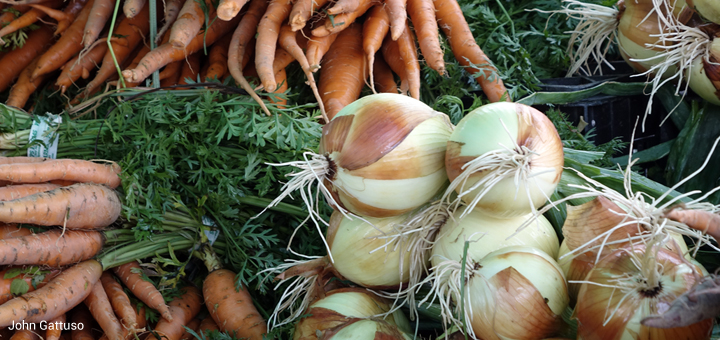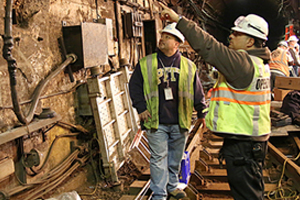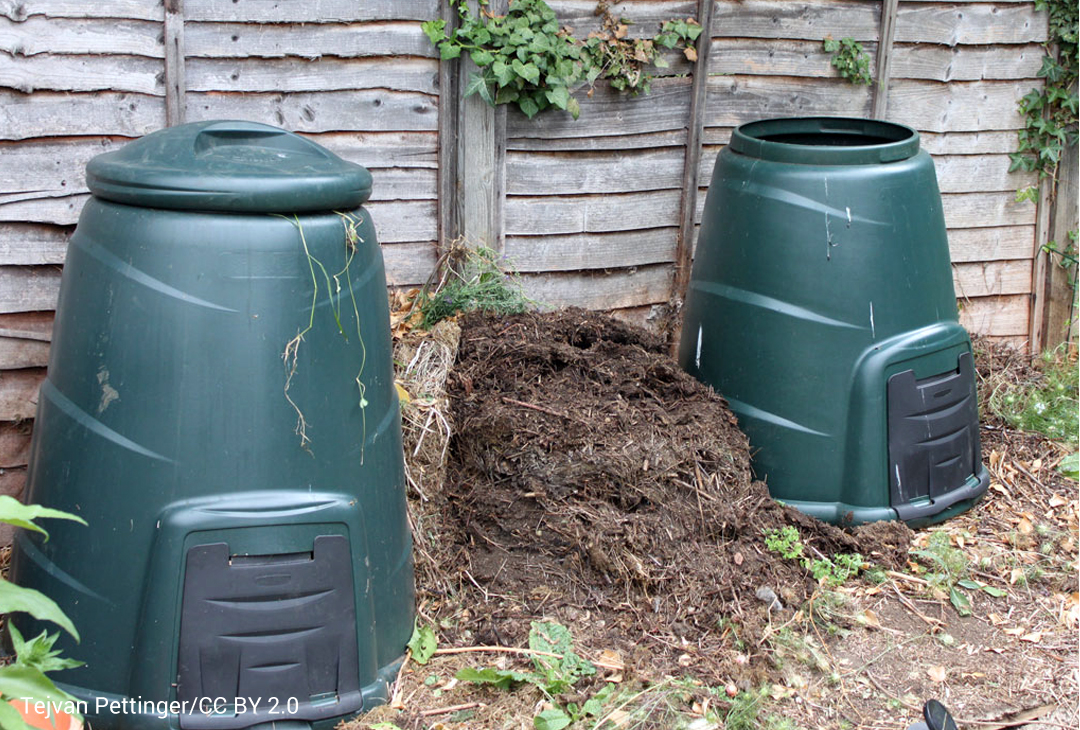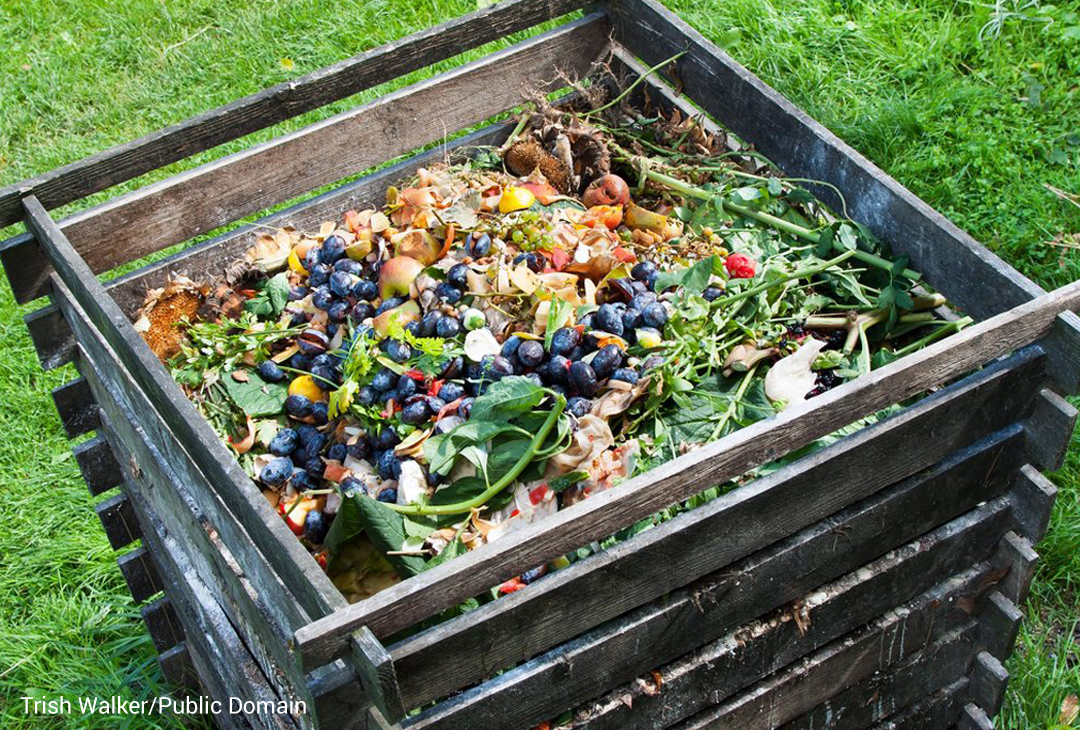MAY 2020
Climate-Smart Gardening
These simple techniques can help you reduce emissions, conserve water, and store more carbon in plants and soil.
Climate change is prompting farmers in New Jersey and around the world to rethink the way they practice agriculture by adapting to changing weather patterns, reducing greenhouse gas emissions, and boosting the capacity of soil and plants to store – or sequester – carbon from the atmosphere.
Although home gardeners operate on a much smaller scale than commercial farmers, they can make important changes, too. Here are ten tips to creating your own climate-smart patch of the Garden State.
1. COMPOST
Healthy soils form the base of thriving ecosystems. Soils rich with organic matter sustain beneficial organisms, retain moisture, and help remove and hold atmospheric carbon.
To build healthy soils, start with something we all have plenty of – food and yard waste. Composting fruit and vegetable scraps, coffee grounds, sawdust, grass clippings, and dead leaves (but never meat, bones, diseased plants, or pet waste) will create a rich organic material that can be used as a mulch or soil conditioner.
Compost is a valuable soil amendment because it improves fertility, soil structure, and water-holding capacity and keeps waste out of landfills where it releases methane, a potent greenhouse gas. But don’t try growing plants in compost alone. Instead blend 2–3 inches of compost into 4–6 inches of topsoil for a new planting, or apply a thin layer on the surface of established beds (1 inch) or lawn areas (half inch) to be worked into the soil by insects and earthworms.
There are many ways of creating a compost pile – a simple fence of wood pallets, for example, or a store-bought compost tumbler. For tips on how to get started, consult with the Rutgers New Jersey Agricultural Experiment Station, your local Cooperative Extension, or the Rutgers Master Gardeners. And see the following Rutgers Cooperative Extension Fact Sheets for more information about soil organic matter: FS1135; FS1136; and FS1137.
Compost bins can be bought at garden centers or made at home; there is a wide range of sizes and designs.
2. GROW FOOD
According to the EPA, agriculture accounts for nine percent of U.S. greenhouse gas emissions, part of which are generated by food processing and transportation. By growing some of your own fruits and veggies in a climate-smart garden, you can reduce the amount of fossil fuels consumed to bring food to market and you’ll have the added benefit of enjoying fresh, tasty homegrown produce.
3. BE WATER WISE
In addition to increased warming, New Jersey is expected to experience heavier rains and more frequent dry spells due to climate change. You can make the most of those downpours and protect your yard from heat and drought by collecting water from your roof in covered rain barrels. A drip irrigation system will help conserve water even more, as opposed to conventional sprinklers which tend to waste water through runoff and evaporation. Mulching around the base of plants and occasionally using shade cloth will help prevent moisture loss on the hottest days.
Be advised that there’s some debate about the safety of using rainwater from rooftops on edible plants. For more information and safety tips, see this Rutgers Cooperative Extension Fact Sheet (FS1218). Or simply play it safe and use water from rain barrels on your lawn, flowers, and other ornamental plants.
4. COVER UP
Planting cover crops during the off-season and allowing plant residue to decompose in place will help hold soil during heavy rains, protect soil during droughts, and build up additional organic matter. Cover crops capture nutrients in their plant tissue that are returned to the soil once they are turned in or mowed; this prevents nutrient loss and runoff during rain and can offset the need for fertilizer, which increases your garden’s carbon footprint.
5. DO NOT DISTURB
Go easy with that rototiller. Tearing up soil with a plow, a mechanized tiller, or even a shovel speeds the release of carbon into the atmosphere, disrupts soil structure and beneficial organisms, and makes soil vulnerable to erosion. While tillage initially increases porosity, soil is susceptible to settling and compaction afterward. Tillage may be a useful shortcut if there’s a strong need to incorporate soil amendments (compost, limestone, or fertilizer) or loosen compacted layers, but routine annual tillage can do more harm than good.
6. USE MANUAL TOOLS
Lawn and garden equipment like lawn mowers and leaf blowers account for a significant portion of U.S. nonroad gasoline emissions. For a climate-smart alternative, choose hand-powered tools instead. Tools like reel mowers, trowels, and pitchforks may require more elbow grease than their gas-powered alternatives, but they are better for the environment – and can be a great workout.
7. GO NATIVE
Native plants have adapted to New Jersey’s varied environment over thousands of years. Because they’re perfectly suited to the area, they require less watering and fertilizer than non-native alternatives, and they complement local ecosystems, attracting pollinators, birds, and beneficial insects. You can find native plants at your local greenhouse or with the help of the New Jersey Agricultural Experiment Station or jerseyyards.org. Be aware that even native plants at the southern edge of their hardiness zone may be stressed under a warmer climate, and always consider site conditions such as drainage and wetness when selecting plants.
8. PREPARE FOR PESTS
From insects to invasive plants, pests are a fact of life for gardeners. With New Jersey experiencing longer summers and milder winters due to climate change, pests that in the past would have been killed off by cold weather may proliferate, and pesticide use may increase as a result. Pesticides, however, can kill beneficial organisms and disrupt local ecosystems.
You can take an integrated pest management (IPM) approach to addressing pests in your climate-smart garden to both reduce plant loss and minimize pesticide use. This approach emphasizes managing pests, not eradicating them, and prioritizes the least damaging treatments.
Get to know your garden and the creatures and plants that frequent it, and only act to address pests when they reach a damaging level. If you do use chemicals, opt for the least toxic alternatives, like insecticidal soaps and diatomaceous earth.
9. EMBRACE WEEDS
Not all weeds are a nuisance. Weeds can be a valuable form of ground cover, adding to the biodiversity of your garden, supporting pollinator insects, and breaking down into soil-enriching organic material in cooler seasons. Only remove weeds that are invasive or that will harm or hinder your plants and broader ecosystem. Otherwise, embrace the adage that one gardener’s weed is another’s wildflower.
10. PLANT A TREE
Trees serve as a “carbon sink.” They absorb and store carbon from the atmosphere and, if planted in the right spot, will provide your home with cool shade in summer and protection from bitter winds in winter. So, if space allows, plant a tree … or several. They will help remove carbon dioxide from the atmosphere, reduce emissions from cooling and heating, and give you a shady spot to rest after working in the garden.
For additional gardening resources, visit the Rutgers Cooperative Extension’s Home, Lawn, and Garden web page and its catalog of landscape and gardening publications.
More Climate Briefs
Transportation and Climate

Ocean Acidification
How to Adapt to Climate Change
The National Flood Insurance Program and New Jersey
Climate-Smart Gardening
How to Reduce Your Greenhouse Gas Emissions
Farming, Food, and Climate Change in New Jersey

Climate Change, Health, and Equity in New Jersey
Sea Level Rise in New Jersey: Projections and Impacts





 Angel Alguera
Angel Alguera Daniel Gilkeson
Daniel Gilkeson Benjamin Goldberg
Benjamin Goldberg Surya Jacob
Surya Jacob Vineesh Das Kodakkandathil
Vineesh Das Kodakkandathil Douglas Leung
Douglas Leung Nihar Mhatre
Nihar Mhatre Justin Morris
Justin Morris Josephine O’Grady
Josephine O’Grady Jessica Parineet
Jessica Parineet Dillan Patel
Dillan Patel Moira Sweeder
Moira Sweeder